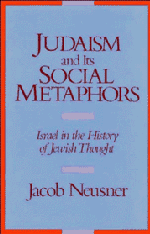Book contents
- Frontmatter
- Contents
- Preface
- List of Abbreviations
- Introduction
- 1 Imagining Society, Re-visioning “Israel”
- PART I “Israel” in the First Statement of Judaism, 70–300 C.E.
- 2 “Israel” in Relationship to Heaven
- 3 “Israel” in Relationship to “Non-Israel”
- 4 “Israel” in the Mishnah, the Tosefta, and Tractate Abot: A Probe
- 5 The First Phase of the Judaism of the Dual Torah and Its Social Metaphors
- PART II “Israel” in the Second Statement of Judaism, 300–600 C.E.
- PART III Same Metaphors, Other Systems
- General Index
- Index to Biblical and Talmudic References
3 - “Israel” in Relationship to “Non-Israel”
Published online by Cambridge University Press: 04 August 2010
- Frontmatter
- Contents
- Preface
- List of Abbreviations
- Introduction
- 1 Imagining Society, Re-visioning “Israel”
- PART I “Israel” in the First Statement of Judaism, 70–300 C.E.
- 2 “Israel” in Relationship to Heaven
- 3 “Israel” in Relationship to “Non-Israel”
- 4 “Israel” in the Mishnah, the Tosefta, and Tractate Abot: A Probe
- 5 The First Phase of the Judaism of the Dual Torah and Its Social Metaphors
- PART II “Israel” in the Second Statement of Judaism, 300–600 C.E.
- PART III Same Metaphors, Other Systems
- General Index
- Index to Biblical and Talmudic References
Summary
“Israel” for the Mishnah's Authorship
This general account of “Israel” as principal sector of the Mishnah's authorship's thought on sanctification brings to the surface the implicit premises of the system as a whole. But when we come to the place and role of “Israel” as these are explicitly defined, the picture changes considerably. True, “Israel” forms the ubiquitous premise of discourse, being the individual person, the “enlandized” nation, the universal and transnational, nonlocative people, society, social group, caste or class that the context requires. In that way “Israel” ordinarily defines the locus of discourse. But the categorically determinative traits of an, or any, “Israel” rarely dictate details let alone the sheltering context.
At the foundations of the entire Mishnaic system and structure stands the conception of Israel as God's unique and holy people. Yet, so far as the notion of Israel as a holy and supernatural social entity circulated, it played a remarkably slight explicit role in the Mishnah. When “Israel” is explicitly treated as supernatural and holy, the entity constitutes a mere category and serves as the premise for the numerous and commonplace exercises in the distinction of Israel and gentile – part of the vast exercise of ordering and hierarchization that the Mishnah's authorship proposed to accomplish. So as we shall see, “Israel” defines a category among categories, but plays no generative or explicit role. The work of hierarchization forms the staple of the Mishnah's authorship's thought on Israel: in the same genus as other nations or peoples, but different from them as to species – that is to say, “Israel” is an entity that is acted upon, not actor; the fact, not the factor.
- Type
- Chapter
- Information
- Judaism and its Social MetaphorsIsrael in the History of Jewish Thought, pp. 38 - 59Publisher: Cambridge University PressPrint publication year: 1989



